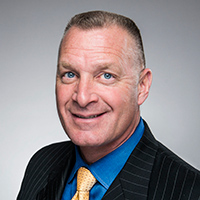An Interest Rate Increase Is Long Overdue
The highly anticipated rise will be good for savers and investors.

Profit and prosper with the best of Kiplinger's advice on investing, taxes, retirement, personal finance and much more. Delivered daily. Enter your email in the box and click Sign Me Up.
You are now subscribed
Your newsletter sign-up was successful
Want to add more newsletters?

Delivered daily
Kiplinger Today
Profit and prosper with the best of Kiplinger's advice on investing, taxes, retirement, personal finance and much more delivered daily. Smart money moves start here.

Sent five days a week
Kiplinger A Step Ahead
Get practical help to make better financial decisions in your everyday life, from spending to savings on top deals.

Delivered daily
Kiplinger Closing Bell
Get today's biggest financial and investing headlines delivered to your inbox every day the U.S. stock market is open.

Sent twice a week
Kiplinger Adviser Intel
Financial pros across the country share best practices and fresh tactics to preserve and grow your wealth.

Delivered weekly
Kiplinger Tax Tips
Trim your federal and state tax bills with practical tax-planning and tax-cutting strategies.

Sent twice a week
Kiplinger Retirement Tips
Your twice-a-week guide to planning and enjoying a financially secure and richly rewarding retirement

Sent bimonthly.
Kiplinger Adviser Angle
Insights for advisers, wealth managers and other financial professionals.

Sent twice a week
Kiplinger Investing Weekly
Your twice-a-week roundup of promising stocks, funds, companies and industries you should consider, ones you should avoid, and why.

Sent weekly for six weeks
Kiplinger Invest for Retirement
Your step-by-step six-part series on how to invest for retirement, from devising a successful strategy to exactly which investments to choose.
Federal Reserve Chairwoman Janet Yellen is at it again—hinting that the time might finally be right to raise interest rates.
Here's hoping it finally happens this year.
What should you do if it does? If you are risk-averse, you can take advantage of the higher yields from bank products such as certificates of deposit, money-market accounts and savings accounts. For those who have exposure to the markets, evaluate your current stock and bond market exposure and make necessary adjustments.
From just $107.88 $24.99 for Kiplinger Personal Finance
Become a smarter, better informed investor. Subscribe from just $107.88 $24.99, plus get up to 4 Special Issues

Sign up for Kiplinger’s Free Newsletters
Profit and prosper with the best of expert advice on investing, taxes, retirement, personal finance and more - straight to your e-mail.
Profit and prosper with the best of expert advice - straight to your e-mail.
The last time the Fed increased rates was December 2015, and an expectation was set at that time—based on the strength of the economy and the labor market—that we would see three to four increases in 2016. So we waited and watched and... nothing.
If the Fed comes through in December, it will be welcome news. As former FDIC Chair Sheila Bair said recently, "We've been keeping interest rates far too low for far too long." The increase needs to be slow and gradual, she told FOX Business Network, "but they need to get on with it."
I agree. The Fed has been roundly criticized by economists and politicians for propping up the U.S. economy, distorting the market and creating a bubble that's doomed to burst. And Yellen has earned a reputation as an interest-rate tease, bouncing back and forth between optimism and pessimism—and taking the American public with her. (The job market is doing well. Yay! But, hold on, there could be significant repercussions from the Brexit. Ohhh!)
Meanwhile, if you're looking for a way to save and invest, you're being punished. If you put your hard-earned dollars in a money-market account or certificate of deposit (you know, the way your risk-averse but savvy-about-saving parents and grandparents did?), you're actually losing money. And you have been for years. Because if you're making 1% interest, and inflation is 1.5% to 2% (those are the Fed's figures, by the way), you're simply not keeping up.
This is especially unfair to older workers who want to move from stocks and bonds to something more conservative as they prepare to retire and to elderly Americans on a fixed income, who rely on interest income to cover their living expenses.
Raise the interest rate, and they'll likely loosen their purse strings, which benefits the economy. And younger investors might learn to keep some money outside of the volatile market—in savings—and use that, instead of credit, to pay for high-ticket items. Imagine that.
We're ready. The Fed's year of waffling sends a message that, when it comes to the economy, at least, things aren't so bad—bumpy, perhaps, but not bottoming out. And a higher interest rate gives the market somewhere to go if things really do go south.
If you remember back to the terrorist attacks in 2001, the interest rates were up around 4% or 5%, which gave the Federal Reserve some wiggle room to reduce rates and bring some calm to the financial markets. When you're at 0%, what are you going to do? There isn't any room left.
Yellen continues to say the Fed's decision on rates will depend on economic data and not a preset timetable. Let's just hope when the increase finally comes, it isn't too little too late.
Christopher A. Murray is a professional financial adviser, insurance professional and president of the Maryland-based Murray Financial Group. He is a Certified Fund Specialist and Board Certified in Mutual Funds.
Kim Franke-Folstad contributed to this article.
Profit and prosper with the best of Kiplinger's advice on investing, taxes, retirement, personal finance and much more. Delivered daily. Enter your email in the box and click Sign Me Up.

Christopher A. Murray is a professional financial adviser, insurance professional and president of the Maryland-based Murray Financial Group. He is a Certified Fund Specialist, Board Certified in Mutual Funds and a Certified Senior Consultant. Murray has produced and hosted the weekly "Your Financial Editor" radio show for 17 years and provides daily business and financial market updates. He is an active member of the National Press Club and has contributed to several publications, including "The Wall Street Journal."
-
 Over 65? Here's What the New $6K 'Senior Deduction' Means for Medicare IRMAA Costs
Over 65? Here's What the New $6K 'Senior Deduction' Means for Medicare IRMAA CostsTax Breaks A new deduction for people over age 65 has some thinking about Medicare premiums and MAGI strategy.
-
 U.S. Congress to End Emergency Tax Bill Over $6,000 Senior Deduction and Tip, Overtime Tax Breaks in D.C.
U.S. Congress to End Emergency Tax Bill Over $6,000 Senior Deduction and Tip, Overtime Tax Breaks in D.C.Tax Law Here's how taxpayers can amend their already-filed income tax returns amid a potentially looming legal battle on Capitol Hill.
-
 5 Investing Rules You Can Steal From Millennials
5 Investing Rules You Can Steal From MillennialsMillennials are reshaping the investing landscape. See how the tech-savvy generation is approaching capital markets – and the strategies you can take from them.
-
 When Estate Plans Don't Include Tax Plans, All Bets Are Off: 2 Financial Advisers Explain Why
When Estate Plans Don't Include Tax Plans, All Bets Are Off: 2 Financial Advisers Explain WhyEstate plans aren't as effective as they can be if tax plans are considered separately. Here's what you stand to gain when the two strategies are aligned.
-
 Counting on Real Estate to Fund Your Retirement? Avoid These 3 Costly Mistakes
Counting on Real Estate to Fund Your Retirement? Avoid These 3 Costly MistakesThe keys to successful real estate planning for retirees: Stop thinking of property income as a reliable paycheck, start planning for tax consequences and structure your assets early to maintain flexibility.
-
 I'm a Financial Planner: These Small Money Habits Stick (and Now Is the Perfect Time to Adopt Them)
I'm a Financial Planner: These Small Money Habits Stick (and Now Is the Perfect Time to Adopt Them)February gets a bad rap for being the month when resolutions fade — in fact, it's the perfect time to reset and focus on small changes that actually pay off.
-
 Social Security Break-Even Math Is Helpful, But Don't Let It Dictate When You'll File
Social Security Break-Even Math Is Helpful, But Don't Let It Dictate When You'll FileYour Social Security break-even age tells you how long you'd need to live for delaying to pay off, but shouldn't be the sole basis for deciding when to claim.
-
 I'm an Opportunity Zone Pro: This Is How to Deliver Roth-Like Tax-Free Growth (Without Contribution Limits)
I'm an Opportunity Zone Pro: This Is How to Deliver Roth-Like Tax-Free Growth (Without Contribution Limits)Investors who combine Roth IRAs, the gold standard of tax-free savings, with qualified opportunity funds could enjoy decades of tax-free growth.
-
 One of the Most Powerful Wealth-Building Moves a Woman Can Make: A Midcareer Pivot
One of the Most Powerful Wealth-Building Moves a Woman Can Make: A Midcareer PivotIf it feels like you can't sustain what you're doing for the next 20 years, it's time for an honest look at what's draining you and what energizes you.
-
 I'm a Wealth Adviser Obsessed With Mahjong: Here Are 8 Ways It Can Teach Us How to Manage Our Money
I'm a Wealth Adviser Obsessed With Mahjong: Here Are 8 Ways It Can Teach Us How to Manage Our MoneyThis increasingly popular Chinese game can teach us not only how to help manage our money but also how important it is to connect with other people.
-
 Looking for a Financial Book That Won't Put Your Young Adult to Sleep? This One Makes 'Cents'
Looking for a Financial Book That Won't Put Your Young Adult to Sleep? This One Makes 'Cents'"Wealth Your Way" by Cosmo DeStefano offers a highly accessible guide for young adults and their parents on building wealth through simple, consistent habits.